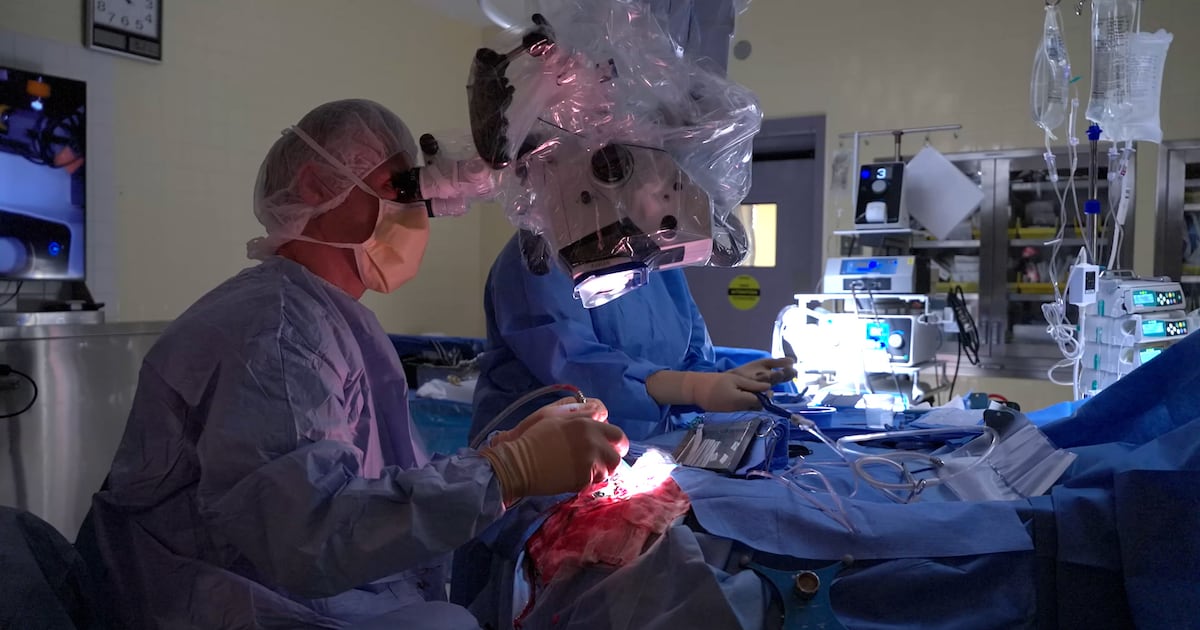Science
Montreal’s AI-Powered Device Transforms Lives of Cancer Patients

A groundbreaking surgical device developed in Montreal is changing the lives of cancer patients, allowing them to live significantly longer after surgery. Patients like Peter Ross, who was given just 14 months to live following a brain tumor diagnosis nearly four years ago, are now celebrating milestones with their families thanks to this innovative technology.
Ross, now preparing to become a grandfather, attributes his extended life to the SENTRY device, which employs artificial intelligence (AI) to distinguish between cancerous and healthy tissue during surgery. “It’s given me the rest of my life,” said Ross, expressing gratitude for the second chance he received. His wife, Sandrine Menard, echoed his sentiments, saying, “Whatever happens, we’re grateful.”
Revolutionizing Cancer Surgery
The device was co-founded by Dr. Kevin Petrecca, a neurosurgeon at the Montreal Neuro. According to Petrecca, SENTRY has an impressive accuracy rate, identifying tumors correctly 98.7 percent of the time. Equally important, when it indicates that tissue is normal, it is correct 100 percent of the time.
Cancerous cells are often invisible to the naked eye, making tools like SENTRY essential for effective surgical outcomes. “You make contact with the spot, and you will get feedback within less than three seconds if it contains tumor cells or not,” explained Petrecca. Such rapid and accurate diagnostics enable surgeons to excise more cancerous tissue than ever before, enhancing patient survival rates.
Petrecca estimates that using SENTRY can extend a patient’s life by two to five times longer than expected post-surgery. While the device has primarily been tested in brain surgeries, its applications extend to other areas, including breast and lung cancer detection. Hundreds of patients, including Ross, have participated in clinical trials, providing invaluable data on the device’s effectiveness.
Looking Ahead
Ross reflects on his ongoing journey, stating, “I take every extra day that’s given to me to go out and walk, and just enjoy life because I owe that to this surgery.” As the device prepares for a pivotal trial slated for May 2024, the next significant step is to secure approval from the FDA.
Ross remains hopeful that, following the trial, SENTRY will assist more patients in experiencing life-changing moments. The potential for this technology to transform cancer treatment is not just a medical advancement; it represents renewed hope for patients and their families, illustrating the profound impact of innovation in healthcare.
-

 Politics4 weeks ago
Politics4 weeks agoSecwepemc First Nation Seeks Aboriginal Title Over Kamloops Area
-

 World5 months ago
World5 months agoScientists Unearth Ancient Antarctic Ice to Unlock Climate Secrets
-

 Entertainment5 months ago
Entertainment5 months agoTrump and McCormick to Announce $70 Billion Energy Investments
-

 Science5 months ago
Science5 months agoFour Astronauts Return to Earth After International Space Station Mission
-

 Lifestyle5 months ago
Lifestyle5 months agoTransLink Launches Food Truck Program to Boost Revenue in Vancouver
-

 Technology3 months ago
Technology3 months agoApple Notes Enhances Functionality with Markdown Support in macOS 26
-

 Lifestyle3 months ago
Lifestyle3 months agoManitoba’s Burger Champion Shines Again Amid Dining Innovations
-

 Top Stories2 months ago
Top Stories2 months agoUrgent Update: Fatal Crash on Highway 99 Claims Life of Pitt Meadows Man
-

 Politics4 months ago
Politics4 months agoUkrainian Tennis Star Elina Svitolina Faces Death Threats Online
-

 Sports5 months ago
Sports5 months agoSearch Underway for Missing Hunter Amid Hokkaido Bear Emergency
-

 Politics5 months ago
Politics5 months agoCarney Engages First Nations Leaders at Development Law Summit
-

 Technology5 months ago
Technology5 months agoFrosthaven Launches Early Access on July 31, 2025




















